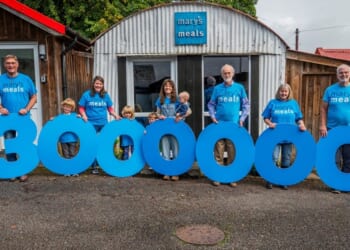Bring us, O Lord God, at our last awakening into the house and gate of Heaven, to enter into that gate and dwell in that house, where there shall be no darkness nor dazzling, but one equal light; no noise nor silence, but one equal music; no fears or hopes, but one equal possession; no ends or beginnings, but one equal eternity, in the habitations of thy glory and dominion, world without end. Amen.
John Donne (1572-1631)
EVER since studying the metaphysical poets at school, I’ve felt a visceral connection with John Donne: something about the passion, the challenge to God, the immersion in life and living, the inner tussle, the complexity. His voice made me feel less alone in my teenage “all or nothing” questions about faith, life, and love. Later, when I was reading 17th-century history at university, he made another appearance in the texts I was studying, this time when he was a priest and Dean of St Paul’s, during a turbulent time for both Church and State. I became mildly obsessed with the years leading up to the English Civil War. Donne’s death, in 1631, marked the end of a decade when, arguably, the die was cast for the first, short-lived, and only English republic after centuries of religious violence.
Later, when I served at St Paul’s as Canon Precentor, I would stand every day in the Dean’s Aisle beside the now-upright statue of Donne — the statue that, after Donne’s death, had lain on his tomb in the old St Paul’s (a statue made from a sketch of him posing in his shroud, so focused was he on his own death). And, in the study of the then Dean, John Moses, I would often sit opposite the copy portrait of Donne (the original is in the V&A): open-shirted, rather louche, gazing directly out at the viewer, almost daring you to criticise his lively and irrepressible appetites for both religion and sex.
THIS prayer is one that I have both sung and said for decades (it was set to music for double choir by William Harris, in 1959). I know it by heart, and I imagine I might want to try to say it, if I get the chance, close to the end. I love the directness of the opening: “Bring us”. Not “please would you” or “we beg you” but, in typical Donne style, a direct challenge — instruction? — to God.
Not diffident, but confident (he can sound over-confident, sometimes), Donne’s spirituality has a sense of knowing that he needs forgiveness and mercy, while at the same time fully expecting it to come. And it’s “us”, not “me”. Even while approaching my own death, I am (he teaches me in this prayer) not alone.
It is taken from a sermon preached at Whitehall on Tuesday 29 February 1628: an exceptional prayer for an exceptional day. And, given Donne’s turbulent life-events and his persistently passionate love poetry and evident appetites, the evenness of the language in this prayer makes me feel that he is battling his doubt even while he imagines “one equal eternity”.
THE prayer has a context and a hinterland that mean that its rhythm and balance have their roots in what (we know from his other writing) was much more chaotic living. Formerly a serving soldier, a prisoner in the Fleet Prison, a Roman Catholic, and the architect of a secret elopement with the niece of his employer, Donne is thoroughly human, at the same time as pointing us towards the divine.
Deeply flawed, the man who in 1606 wrote to the Dean of Gloucester saying that he was not worthy of Holy Orders is now looking God in the eye, believing that the end is, in fact, the last in a series of awakenings. Earlier in the sermon from which this prayer is taken, Donne imagines the transition from life into death as not so much giving up the house that we’re currently living in as travelling “to see and learn better architecture”.
I REGULARLY read this prayer over coffins. In the presence of the dead, it is a prayer that means a lot to the gathered who are still living. Its directness and beauty remind us that death and life are but a breath apart, that this sensory life is not for ever. It reassures us that what we know in this life about noise, light, fear, and hope is recognisable in the next, but given new meaning and depth by the equal silence and dazzling darkness of eternity.
Above all, Donne’s conviction is that heaven is a place to which we can travel. Although it is a place that we cannot yet imagine, it is not far away, but we will know ourselves afresh when we get there. And — if Donne is to be believed — get there we will.
The Revd Lucy Winkett is Rector of St James’s, Piccadilly, and Priest-in-Charge of St Pancras Church, Euston Road, in the diocese of London.














